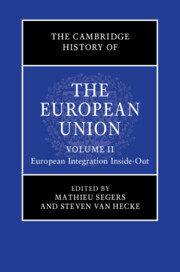Book contents
- The Cambridge History of the European Union
- The Cambridge History of the European Union
- The Cambridge History of the European Union
- Copyright page
- Contents
- Figures
- Tables
- Contributors to Volume II
- Acknowledgements
- Abbreviations
- Reflections on the History and Historiography of European Integration
- Part I Milestones: Treaties and Treaty Changes
- Part II Instruments of Integration
- Part III Narratives and Outcomes
- War and Peace
- Prosperity and Solidarity
- 19 The EU and the Narrative of Prosperity
- 20 Changing Europe’s Economic History
- 21 The EU and the Narrative of Solidarity
- 22 European Solidarity: The Difficult Art of Managing Interdependence
- Democracy and Legitimacy
- Index
- References
19 - The EU and the Narrative of Prosperity
from Prosperity and Solidarity
Published online by Cambridge University Press: 12 October 2023
- The Cambridge History of the European Union
- The Cambridge History of the European Union
- The Cambridge History of the European Union
- Copyright page
- Contents
- Figures
- Tables
- Contributors to Volume II
- Acknowledgements
- Abbreviations
- Reflections on the History and Historiography of European Integration
- Part I Milestones: Treaties and Treaty Changes
- Part II Instruments of Integration
- Part III Narratives and Outcomes
- War and Peace
- Prosperity and Solidarity
- 19 The EU and the Narrative of Prosperity
- 20 Changing Europe’s Economic History
- 21 The EU and the Narrative of Solidarity
- 22 European Solidarity: The Difficult Art of Managing Interdependence
- Democracy and Legitimacy
- Index
- References
Summary
Since its very beginnings, a central narrative of European integration has been that only a form of profound cooperation between the European states will allow the promotion of prosperity and social security. The narrative of prosperity is one of the oldest and most constant meta-arguments of regional European integration. The Schuman Declaration of 9 May 1950 already stated that the European Coal and Steel Community (ECSC) would contribute to ‘raising living standards’.1 In the European Union’s (EU’s) self-portrayal, prosperity, growth and employment are still among its hardly questioned and fundamental goals, as former President of the Commission Emanuel Barroso put it: ‘Today the raison d’être of our Union is also the same that was there sixty years ago: peace, democracy, to be freed from fears, mistrust and divisions, to share security, stability and prosperity.’
- Type
- Chapter
- Information
- The Cambridge History of the European Union , pp. 540 - 564Publisher: Cambridge University PressPrint publication year: 2023

